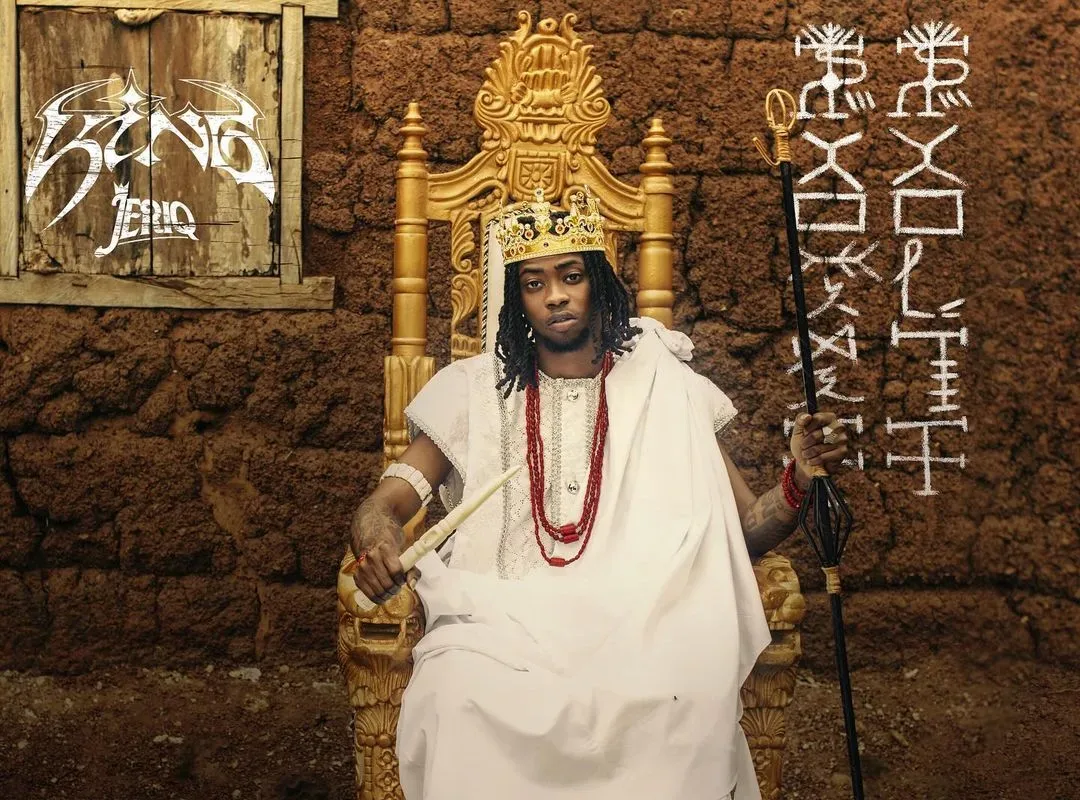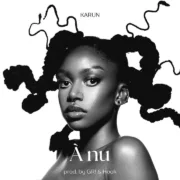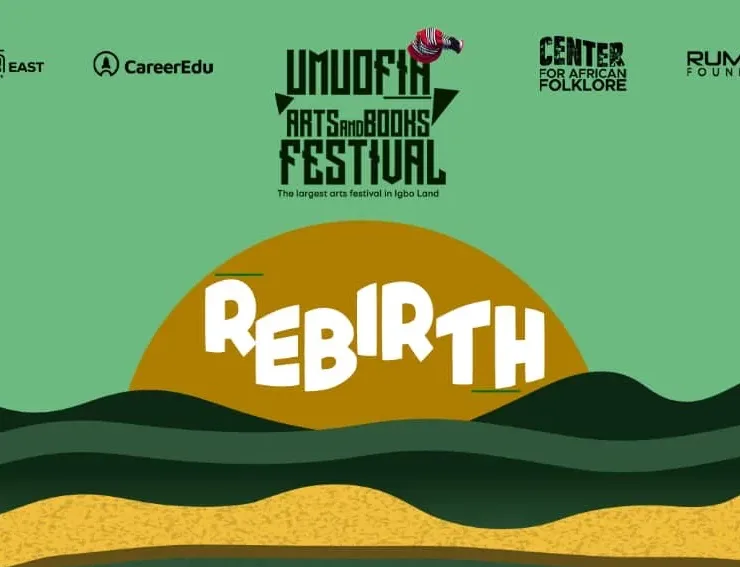Jeriq’s King is a jubilant album. Throughout its runtime, the songs burst with enthusiasm, practically leaping out of the speakers at listeners. Much more than that, it serves as the rapper’s celebration of his success and a coronation of his efforts.
By Michael Chiedoziem Chukwudera
In his new album, King, the Igbo rapper, Jeriq, currently one of the most popular rap sensations in Africa, continues his narrative of rising from the trenches and crowns himself a king among his peers. A few days after the album dropped, the rapper released a video where he is crowned by Phyno, arguably the most successful Igbo rapper and a major figure in the continental scene, with a voiceover from Nollywood legend, Pete Edochie. The presence of these men in Jeriq’s video feels like a consensus across generations in this coronation.
As a brand and an artiste who represents the aspirations of his origins, there is no doubt Jeriq is far ahead of his peers in this respect. What is emerging from southeastern Nigeria is a golden age of Hip-Hop.
In the scene alongside Jeriq are prodigies like Rhatti, whose recent album, DVNTE, is arguably one of the best to come out of Nigeria this year (indeed, in the last three years); Nuno Zigi, whose 2024 EP, Zero Caution, displays nothing short of a stellar performance typical of the finest Hip-Hop the country has seen; Kolaboy, who has shown dexterity in rap, folkloric music, and more recently trap music; and Aguero Banks, Highstarlavista, Hugo P, and others—most of them with forthcoming projects.
Jeriq’s popularity among his peers traces its roots to his extroverted brand and craft, which are both people-friendly and relatable. The engineering of his second album, with its new innovations, further charts this course.
In 15 tracks, Jeriq’s new album, King, artistically depicts the rapper’s successful ascent in the scene, his experiences in his conquest, and his life of superstardom. He invites his peers, the artists he collaborates with, to join him in telling this story.
The album begins with the titular track, “King”, which teems with enthusiasm and celebration. It continues from where Jeriq left off in “Billion Dollar Dreams”, a familiar trope of his. This is followed by “Jehovah”, where Bella Shmurda, one of the most dynamic Nigerian artistes, delivers a fast hook that pushes Jeriq to rap at an increased pace, resulting in a truly enjoyable track.
The third track, “Ije Nwoke”, samples the late Ekpili legend, Morocco Maduka, at the beginning and sounds even better within the album than it did as a standalone track released earlier. The title, which translates to ‘A Man’s Journey’, reflects on the challenges and exhaustion one faces after a prolonged period of difficult tasks.
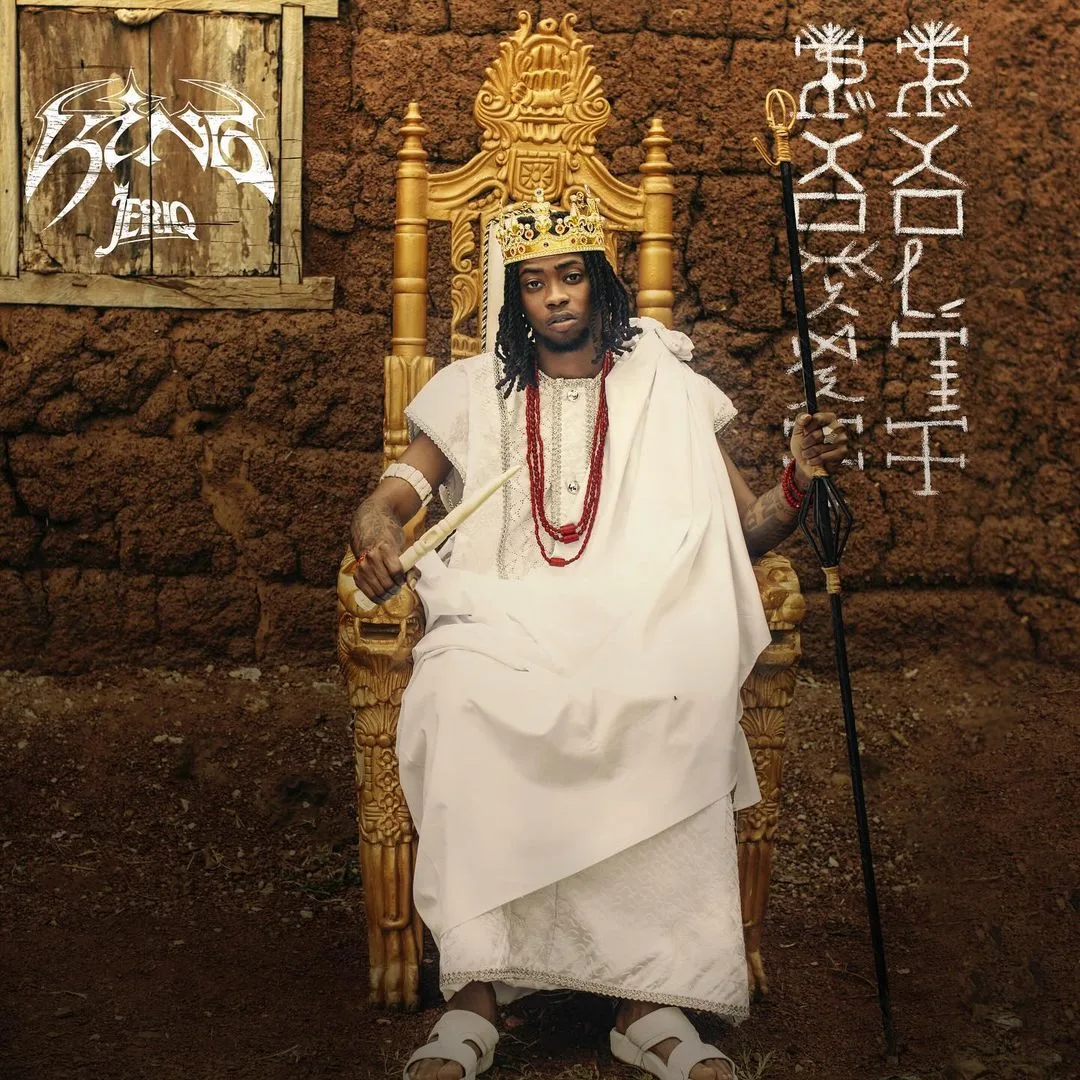
The next three songs, “Mulla on My Medulla”, “Fresh and Dope”, and “Rands on Rands” form a cohesive thematic trinity focused on affluence and its effects. In “Mulla on My Medulla,” which translates to ‘money on my mind’, Jeriq uses an antiphonal style with repetitive singing, creating an enjoyable atmosphere of nightlife merriment and hustle.
In “Fresh and Dope,” Blaqbonez makes a guest appearance, contributing a singsong rap verse that enriches the track. The production mirrors a typical Blaqbonez song, showcasing the album’s sound dexterity. By this point, Jeriq’s successful collaborations are evident. In “Rands on Rands,” Jeriq features South African rapper Maglera Doe Boy, blending Igbo trap, South African Rap, and Amapiano.
It would also seem that Jeriq and Ajebo Hustlers make a good pair in their music. Their song, “Last Week,” from Ajebo Hustlers’ recent album, is a profound meditation on addiction, presenting a musical tour-de-force that is as engrossing as it is engaging.
In King, they link up again in “Way”, a track that brings the Port-Harcourt sound into the album. The song explores sensuality, blending good singing with street sensibilities, where sensuality extends beyond a romantic affair to include a connection with money. The track has a transcendental quality, making it a fitting companion to songs like “Bonjour”, which evokes the atmosphere of a trip to France, and “Ogbe in London”, which captures a transcendent geographic vibe.
One of my favourite tracks in the album is “Ogene” which asides being a thoroughly engrossing track is highly symbolic of Jeriq’s effort over the years to properly infuse indigenous Igbo music sounds into his music. It is symbolic of one of the rapper’s best qualities, his embrace of his Igbo roots which is one of what has made him unique and highly sought after. In this track, the rapper also displays his talent for singing in the Igbo language.
“Update iji kwa” featuring Quincy is also profound; the two Igbo rappers bring their rap game into the track, and like metals sharpening each other, they that showcases the potential of such collaborative efforts in their genre.
The closing track, “Daily Bread”, featuring Victony, is a worthy conclusion to the album. It embodies a calmness that beautifully wraps up the project and stands out as another excellent collaboration, much like many of the songs throughout the album.
The shortcoming in King is that it charts a very familiar trope, as Jeriq’s previous projects, and its opening track almost seemed to go in that direction. However, listening to the whole album, it becomes clear that the rapper has achieved diversity in sound and, to a large extent, in thought.
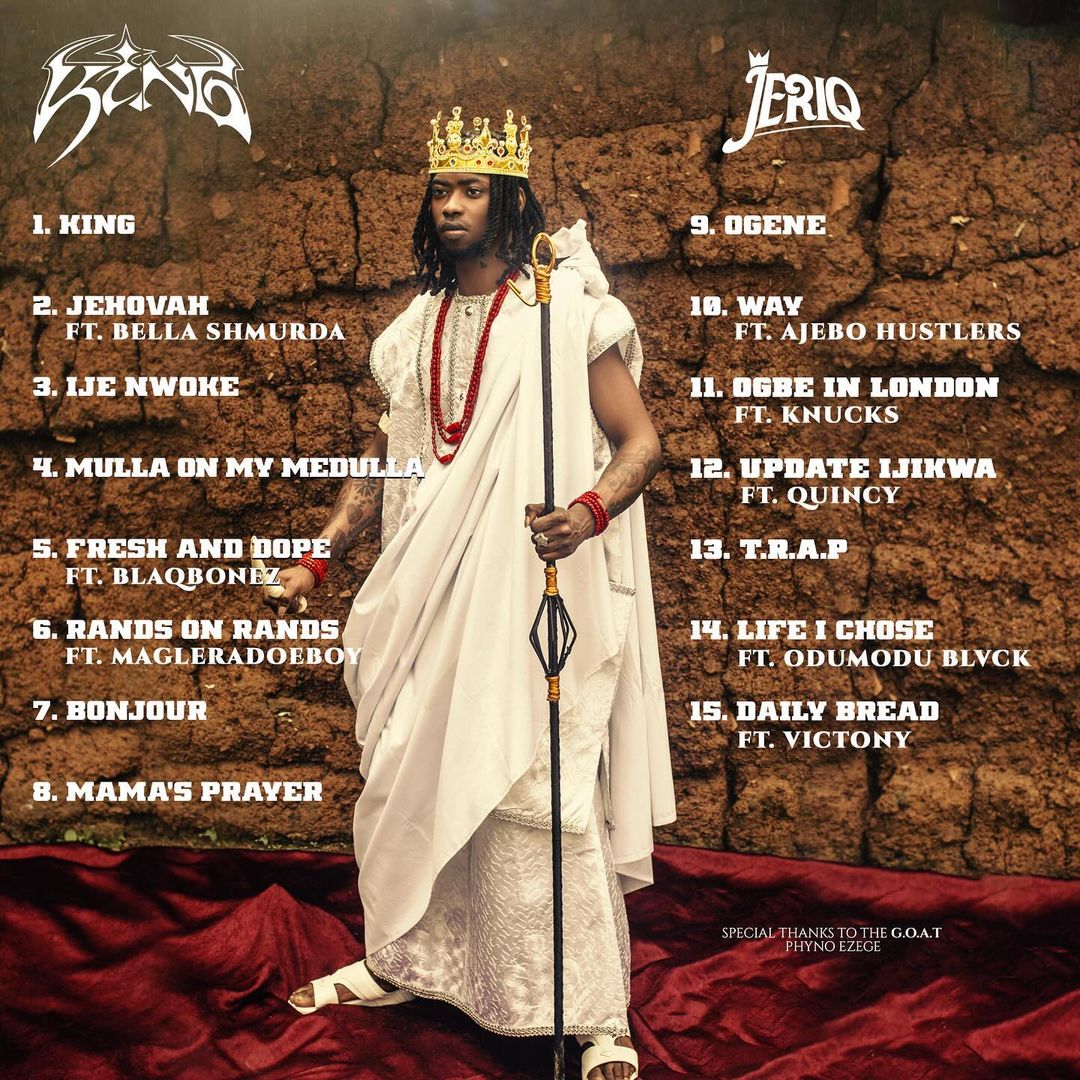
Also, the collaborations in the album were mostly top-notch. This is the case even for the most wayward track in the album, “Life I Chose”, featuring Odumodublvck, the one track I believe the album could have done without, as it doesn’t add depth to the album and only contributes to the trendiness of the album with Odumodublvck’s current popularity in the industry.
Jeriq’s King is a jubilant album. Throughout its runtime, the songs burst with enthusiasm, practically leaping out of the speakers at listeners. Much more than that, it serves as the rapper’s celebration of his success and a coronation of his efforts. By crowning himself king, Jeriq places himself in the spotlight, and in typical Hip-Hop culture, he opens himself up to being challenged by another peer vying for the title of King of Igbo rappers. This album demonstrates why Jeriq stands out as the most intriguing rapper in the current renaissance scene.
He owns the narrative better than any other rapper and orchestrates an image that is extroverted and conscious of its geography. The scene is bursting with talent, but what is Hip-Hop without competition? The future is definitely interesting as one looks forward to what responses Jeriq’s new album would solicit.
Lyricism – 1.3
Tracklisting – 1.5
Sound Engineering – 1.6
Vocalisation – 1.4
Listening Experience – 1.5
Rating 7.3/10
Michael Chiedoziem Chukwudera, a writer and community builder, is the author of the novel, Loss is an Aftertaste of Memories.
Sign Up to Our Newsletter
Get notified about exclusive offers every week!


